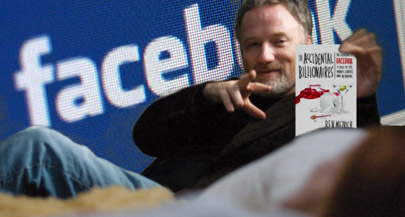2011 Calvin Awards: Best Director
February 18, 2011
BoxOfficeProphets.com

Leading the way is David Fincher for The Social Network, who perhaps had the most difficult job of any of the major contenders this year. Turning Aaron Sorkin's hyper-literate screenplay, devoid of anything you'd call a traditional action scene, into something approaching a heist film is an amazing achievement. Half the film is spent either in boardrooms or with people typing into computers, but these scenes still crackle, and we're on the edge of our seats. Combine that with the great performances he wrested out of some actors that were considered marginal talents at best going in, and we've got a directorial effort for the ages.
Losing by just one first-place vote is Christopher Nolan for Inception. A winner two years ago for The Dark Knight, Nolan repeated his dazzling imagery for this film, which took us on a mind-bending trip through several layers of a man's subconscious, all the while making the amazing and fantastic seem like the most logical possible thing that could be happening. His skill in guiding the audience through different layers of time and space in the film can't be overstated, giving us the greatest thrill ride of the year.
Third place finds its way to Joel and Ethan Coen for True Grit. The Coens faced a huge struggle in bringing this classic western re-adaptation to the screen, in finding a way to make it feel like their own work instead of a retread. Taking us on a ride through desolated Oklahoma badlands, the Coens find a way to make it feel like a trip to another world. Add in some sweeping directorial flair like the final gunfight scene and the midnight ride, and we're thoroughly dazzled by their work here.
Darren Aronofsky is the hard-luck loser in this race, placing fourth by just 20 points (by way of comparison – fourth place last year was 50 points out and his total this year would have missed by just six points last year) for his amazing work with Black Swan. There's a ton to enjoy here in his effort, from the bravura performance he wrenched out of Natalie Portman (reportedly pushing her to her physical limits) to the nightmarish environment he created to torment her character, with split-second visions just on the edge of vision, making you never quite sure what you just saw. Moreover, he made ballet fascinating and gripping to multiplex audiences, and is that a sentence you ever thought you'd see?
After that, the points table falls off a little cliff to Ben Affleck in fifth for The Town. But then, five years ago, would anyone have believed this possible? Shaking off the sophmore jinx, Affleck proved that he's a really, real for realsies capital-D Director with this second Boston crime story, which reminded us of nothing so much as Michael Mann's Heat, but sharper and more concise. Affleck has a natural feel for how insular communities work, and at least while he's working in this genre, has a potential to become “Ben Affleck, the Director” instead of “Ben Affleck, the guy who starred in Paycheck and Reindeer Games”.
Sixth spot goes to one of this year's Oscar favorites, Tom Hooper for The King's Speech. A lot less showy than some of the other top directorial efforts this year, we admired Hooper's deft hand with his actors and the way he turned what could have easily been a filmed play into a visually interesting story. It's a film that's literally about people talking, and we were with him all the way.
Turing a complete 180 from that is Edgar Wright in seventh spot for Scott Pilgrim vs. the World. Wright took what could have been a completely unfilmable graphic novel and made it into something not just coherent, but also something that entirely embodied its hyper-active subject matter. While it's still to be seen if he's really revolutionized film for the next generation, he's definitely given it a shove in a new direction.
This was definitely a year of directors taking on interesting challenges, a theme continued in our eighth place director, 127 Hours' Danny Boyle. Faced with a film that's stuck in one location for 90% of its running length, Boyle turned to numerous and inventive fantasy sequences to tell his story of a man forced to contemplate his life and his mortality. It's a film that you wonder how it could have been pulled off, but after watching Boyle's version, you wonder how it could have been done any other way.
David Russell lands in ninth place with The Fighter. While he may not be known as the most actor-friendly director (just ask George Clooney and Lily Tomlin), Russell found a way to work with this cast to produce a remarkable number of outstanding performances, including Christian Bale (mercurial himself) Melissa Leo, Amy Adams and Mark Wahlberg.
Lee Unkrich wraps up our top ten list with his work on Toy Story 3. Even covering highly familiar ground, Unkrich made the world of toys sparkle one more time with its new cast of characters and its new setting, even finding room for a brilliant set piece or two.
Missing our top ten by that much were Roman Polanski for The Ghost Writer and Debra Granik for Winter's Bone, with The American's Antojn Corbin, Easy A's Will Gluck and Exit Through the Gift Shop's Banksy filling out the next group of five.
The Calvins Introduction
Best Actor
Best Actress
Best Album
Best Cast
Best Character
Best Director
Best Overlooked Film
Best Picture
Best Scene
Best Screenplay
Best Supporting Actor
Best Supporting Actress
Best TV Show
Best Use of Music
Best Videogame
Breakthrough Performance
Worst Performance
Worst Picture